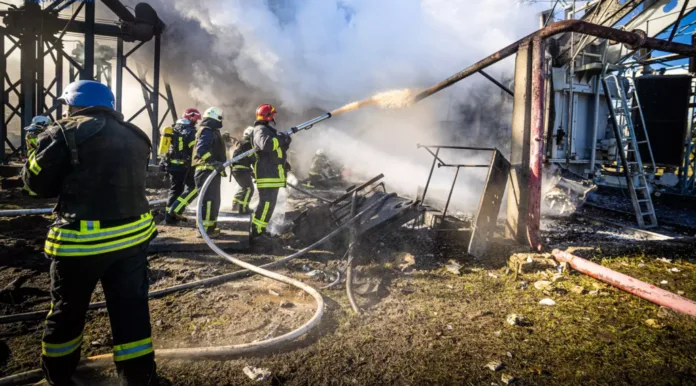On a day traditionally associated with peace and celebration, Russia’s aggressive military actions have cast a dark shadow over Ukraine, intensifying the Ukraine Energy Crisis and shaking its infrastructure and spirit. The barrage of missile and drone attacks, predominantly targeting Ukraine’s energy installations, has left a trail of destruction and fear. Ukrainian President Volodymyr Zelensky, in a poignant yet defiant tone, labelled these attacks as ‘inhumane.’ His words reverberated across the globe, echoing the broader condemnation by Western leaders, including U.S. President Joe Biden, who deemed the actions ‘outrageous.’ This confrontation is not merely a forceful flexing of military might but a grim reminder of the unresolved tensions and escalating conflicts that continue to define the region’s geopolitical landscape.
Since the annexation of Crimea in 2014, Ukraine has been a pivotal point of contention between Russia and the West. The energy infrastructure, a vital component of Ukraine’s economy and civilian life, has frequently been in the crosshairs of Russian tactics intended to cripple Ukraine’s operational capabilities. Analysts argue that these assaults are strategically timed not just to cause immediate harm but to exert long-term pressure on Ukraine, straining its resources and resolve.
As the casualty tolls rise, international figures such as Pope Francis have been vocal in their calls for diplomacy and peace talks. His Christmas message underscored the crisis’s humanitarian toll and the urgent need for resolution. Amidst this international backdrop, there lies a tangible fear of this conflict boiling over into a wider regional flare-up, potentially drawing in NATO and stirring further military engagements.
For those within Ukraine, the attacks on Christmas serve as a chilling commentary on their daily reality—a life marked by sirens, shelters, and the consistent threat of annihilation from an unrelenting adversary. The implications for civilian lives, already wearied by years of conflict, are profound, with immediate impacts on power availability, economic stability, and psychological health.
Internationally, the incident has reignited discussions regarding the adequacy of responses from alliances such as NATO and the EU. Critics argue that reactive sanctions and condemnations may not suffice, pushing for more direct forms of intervention or heightened military support for Ukraine.
As the world watches, the Ukraine Energy Crisis serves as a stark reminder of the fragility of peace and the constant threat posed by global power struggles. The coming days will be crucial in shaping the next phase of this critical situation, as affected nations and international allies consider their next steps in response to Russia’s undeniable aggression.
Embed from Getty ImagesPerspectives
Perspective 1: From the perspective of European geopolitical analysts, Russia’s assault on Ukraine not only highlights the persisting volatility in Eastern Europe but also raises questions about the effectiveness of existing international deterrents. Analysts like Fiona Hill (Council on Foreign Relations) suggest that the West needs to reassess its strategies in curbing Russian aggression. Meanwhile, Ian Brzezinski (Atlantic Council) points out that despite sanctions, Russia’s resolve seems undeterred, indicating a potential need for revisiting engagement tactics with Russia, such as enhanced military support to Ukraine.
Sources:
CFR
Atlantic Council
Perspective 2:Human rights organizations, including Amnesty International, are deeply concerned about the humanitarian implications of Russia’s attacks, particularly the devastating impact on civilian populations and Ukraine’s energy infrastructure. These acts are seen as clear violations of international humanitarian law. Amnesty International has called upon the UN and global leaders to increase diplomatic efforts to secure an immediate ceasefire and provide support in addressing the ongoing Ukraine Energy Crisis. Meanwhile, Human Rights Watch highlights the psychological toll of these attacks, stressing the urgent need for comprehensive international assistance beyond military measures, focusing on the humanitarian needs driven by the Ukraine Energy Crisis.
Sources:
Amnesty International
Human Rights Watch
Perspective 3: For Ukrainian citizens, commentators like Olena Rybak, a Ukrainian journalist and social activist, state that the attacks are a grim reminder of their existential struggle. In stories shared by local media, the resilience and determination of Ukraine’s populace shine through, despite the evident threat to their very way of life. Ukrainian civil society organizations suggest the attacks are meant to break their spirit and dismantle communal bonds. However, the unity and solidarity demonstrated post attacks point towards a nation that, rather than cowering, stands more resolved to safeguard its sovereignty.
Sources:
Radio Free Europe Radio Liberty
Kyiv Post
